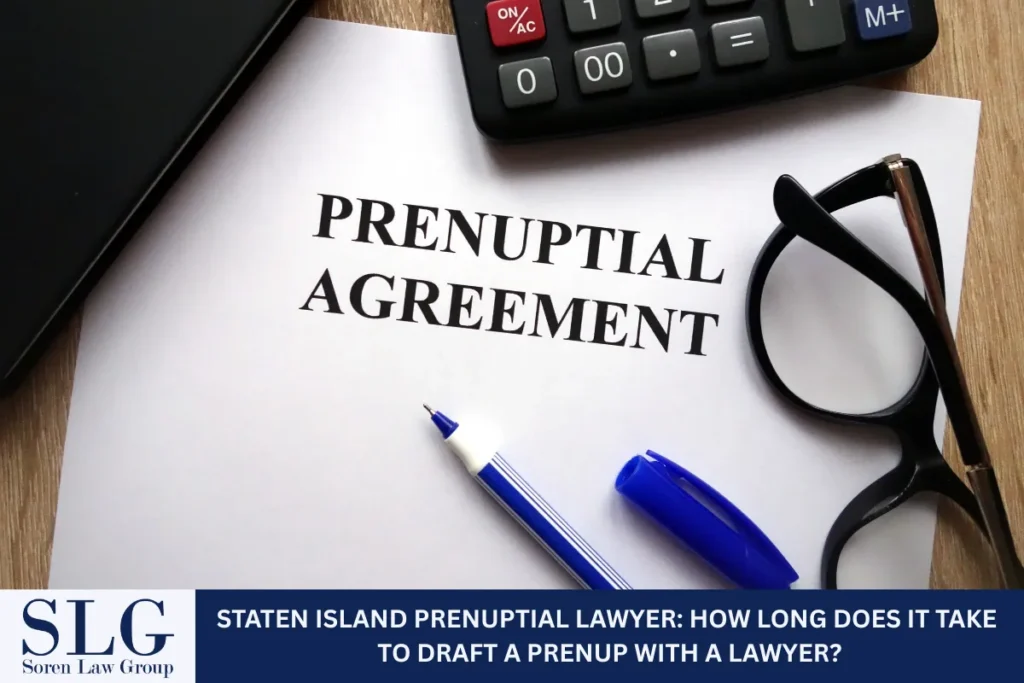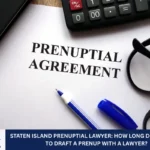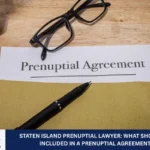Are you wondering how a prenuptial lawyer can help ensure your future—and how long you need to draft a prenuptial agreement before your big day on Staten Island? Here’s the truth: Many engaged couples wait too long, only to find themselves in a stressful, last-minute rush that can put their legal rights and marriage at risk. The process is more complicated than people imagine, especially in New York, where state laws require careful adherence to specific steps. Don’t let confusion or delay threaten your peace of mind. The good news? With the right planning and legal advice, you can protect your financial interests and focus on your special day. This guide will show you exactly how long it takes to get a prenup in Staten Island, the steps involved, and how to make sure your marital agreement is valid in New York.
What Is a Prenuptial Agreement, and Why Does Timing Matter?
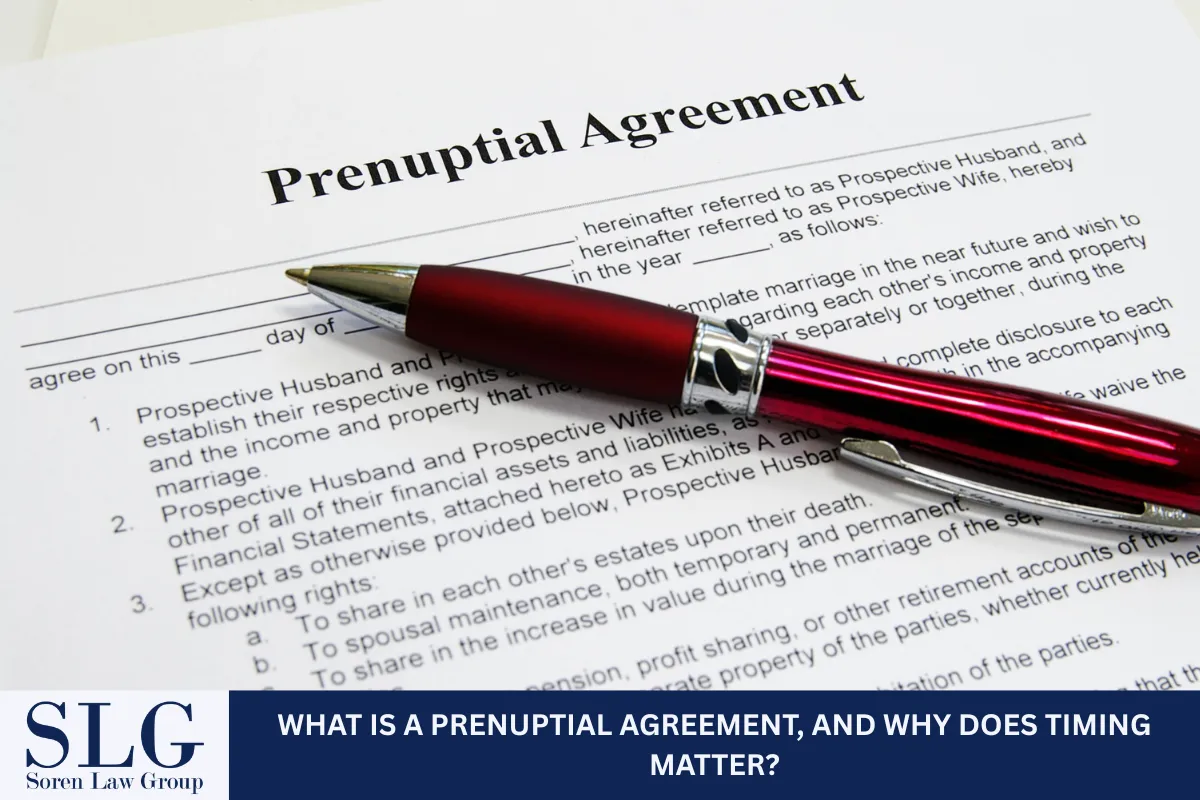
A prenuptial agreement—often called a “prenup”—is a legal document made between two people before they marry. It explains how property, debts, and finances would be managed if the marriage ends in divorce, separation, or upon the death of one of the spouses. In New York, a prenuptial agreement must follow certain legal requirements to be valid. Timing is crucial, as the legal process of drafting, reviewing, and signing this document involves several stages—and rushing could make your agreement vulnerable to legal challenges.
The Prenup Timeline: How Long Does It Take in New York?
Typical Preparation Times
- Simple prenuptial agreement (few assets, straightforward): 3 days to 1-2 weeks
- Standard prenup (home, some investments): 2-4 weeks
- Complex prenup (business, real estate, multiple accounts): 4-8 weeks or more
On Staten Island and throughout New York City, legal professionals recommend starting the drafting process at least 1 to 2 months before the wedding date. The safest window is to finish the prenup 30-60 days before the ceremony.
Why Does It Take This Long?
The process takes time because:
- Each party needs to share full financial information (full and fair disclosure).
- Both parties often have separate lawyers for advice and negotiation, especially when complex assets or businesses are involved.
- There may be several rounds of draft exchanges and negotiations (sometimes called “redlines” or “revisions”).
- There might be delays gathering documents or discussing individual terms.
- New York law encourages that both parties review the agreement for fairness and are not pressured (duress).
Step-by-Step Guide: From Consultation to Signature
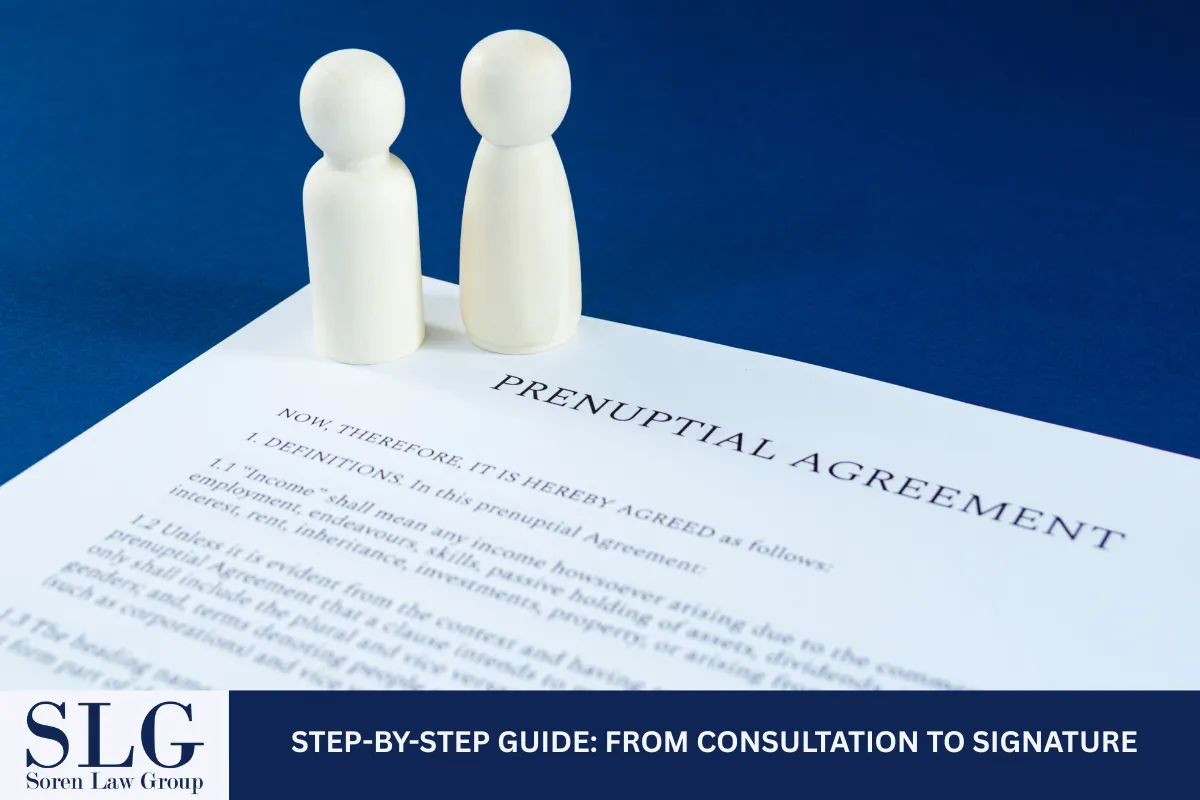
Let’s break down the main stages for drafting a prenuptial agreement in Staten Island or anywhere in New York:
1. Initial Consultation
Begin by contacting a prenuptial lawyer who specializes in family law. The lawyer will explain the process, discuss your needs, and review your assets and debts.
Tip: Both prospective spouses should have their own legal counsel. This helps prevent claims of unfairness or pressure.
2. Financial Disclosure
Each person shares their financial information, such as:
- Bank accounts, investments, and retirement funds
- Real estate (houses, condos, etc.)
- Debts and loans
- Business interests or ownership
- Other valuables (cars, collectibles, etc.)
Keeping full and accurate records is crucial—hiding assets could lead to the prenup being overturned.
3. First Draft
Your lawyer will prepare the first draft, covering issues like:
- Property and asset division
- Spousal support or maintenance
- Inheritance rights and estate planning
- Separate property vs. marital property
- Debts and other liabilities
- Other special terms (sunset clauses, governing law, severability)
4. Negotiation and Revisions
Both lawyers (or, if you use a collaborative approach, a mediator) review the draft. Spouses suggest changes. Negotiations may involve multiple rounds of “redlines.”
Common points of negotiation:
- Whether to waive or limit spousal maintenance (alimony)
- How to classify specific assets as “separate” or “marital”
- How would it be divided if the marriage ends
- Any terms on inheritance or waivers of the “elective share”
- Whether to include a “sunset clause” (ending the prenup after several years)
- Division of business interests and real estate investments
5. Review Period
While New York does not set a required “cooling off” period, finishing early (preferably at least 30 days before the wedding) gives both partners a chance to reflect, ask last questions, and avoid claims of duress.
6. Final Agreement and Execution
Once both parties agree, the final version is prepared.
- Signing: New York requires both signatures to be “acknowledged in the manner required to record a deed.” That means they must sign in front of a Notary Public. Outside witnesses are usually not required, but can be added.
- Delivery: Both parties should be given a copy.
Rush and Last-Minute Prenups: What Happens If Time Runs Out?
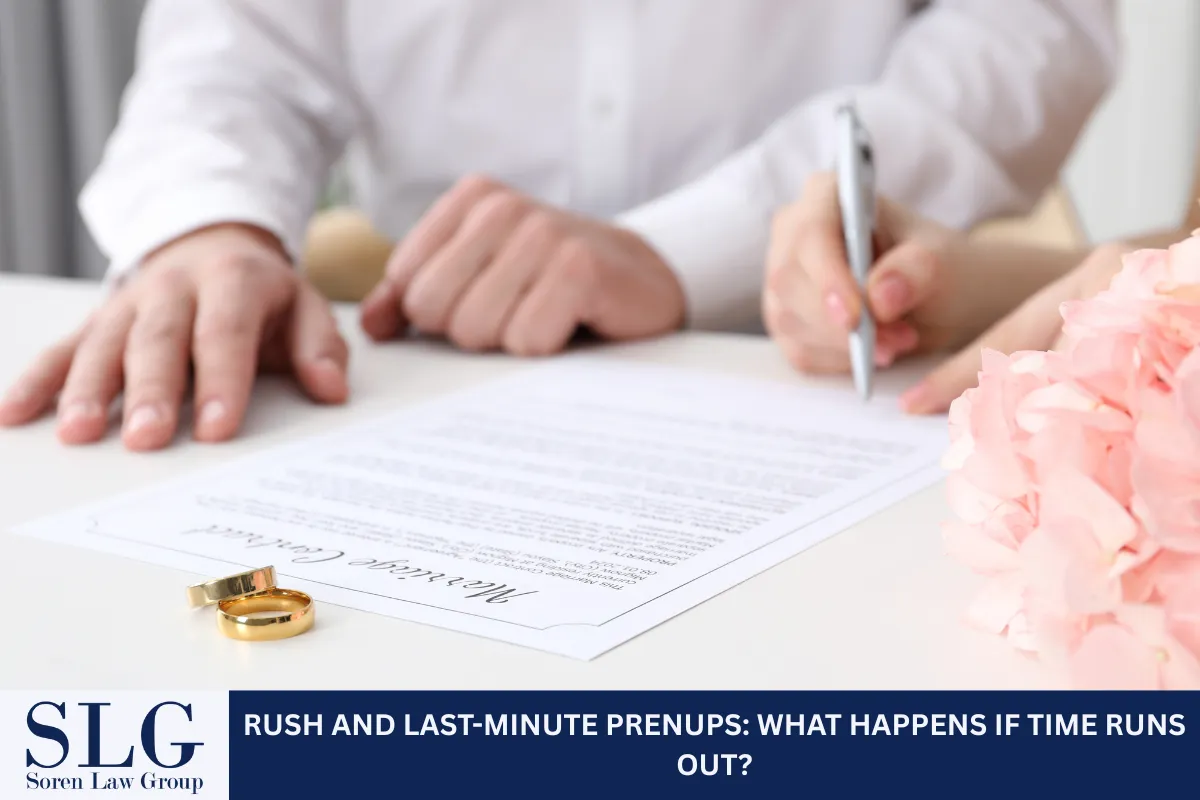
Can a Prenup Be Done Just Before the Wedding?
It is possible to rush a prenuptial agreement—even in the week before the wedding. However, this is very risky in New York, where courts can throw out a prenup if either party claims they were under duress, didn’t have enough time to review it, or didn’t get independent legal advice.
Alternatives: Postnuptial Agreements
If you truly run out of time, a couple can sign a Postnuptial agreement after the wedding. The process, requirements, and protections are very similar to those for prenups, but it’s generally best to resolve these issues before marriage.
Factors That Affect How Long Drafting Takes
Not every prenup is the same. Here are some things that can stretch out the timeline:
- Complex or High-Value Assets: Businesses, trusts, real estate in multiple states, stocks, retirement accounts, and valuable personal property take additional time for careful drafting.
- Multiple Properties or Business Ownership: If you are a business owner or own real estate outside New York, be prepared for a longer discovery and negotiation phase.
- Inheritance Issues: Protecting separate property or planning for children from prior relationships can complicate estate planning.
- Tax Issues: Special planning may be needed for spousal support, property distribution, or estate taxes.
- Communication Gaps: Waiting to answer questions, provide financial documents, or review drafts creates delays.
- Attorneys’ Workloads: If your or your partner’s lawyer is busy or out of the office, document turnaround can slow down.
Key Legal Requirements for a Valid New York Prenuptial Agreement
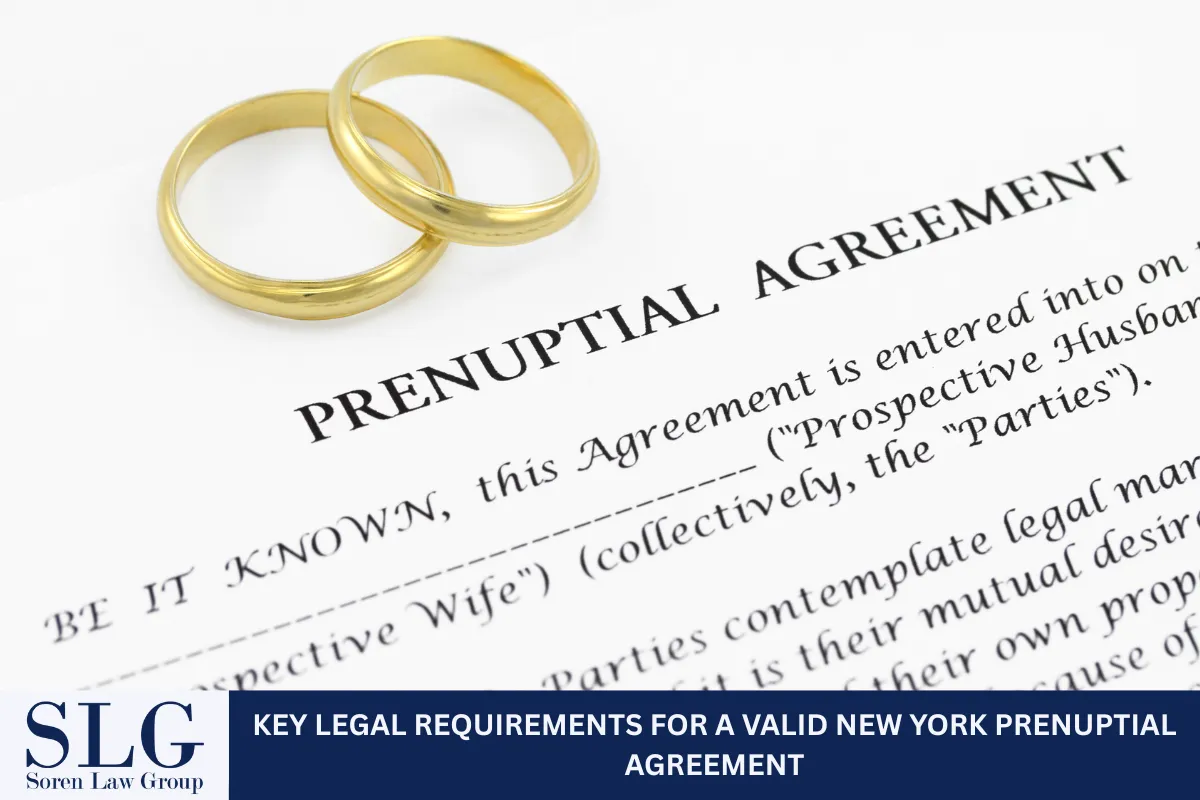
Here’s what makes a prenup enforceable in New York:
- Written agreement: Oral agreements are never valid.
- Voluntary: Both parties must sign freely, with no coercion, duress, or pressure.
- Full and fair disclosure: Both prospective spouses must honestly share all financial information, debts, and assets.
- Executed with proper formalities: Must be signed, acknowledged before a Notary Public (like a deed), and ideally completed well before the wedding.
- Fairness (Unconscionability): Must not be “shockingly unfair” when signing. Grossly one-sided agreements could be overturned.
- Independent Legal Advice: While not a legal requirement, it is strongly advised that each person have their own attorney. This protects both sides and supports enforceability.
- Clear Terms: Issues of marital property, spousal maintenance, property division, and inheritance rights should be spelled out in understandable language.
- Can’t limit child support or custody: A prenup cannot decide custody or limit child support, as New York family law requires courts to determine the best interests of any children at the time of divorce.
What Must Be Disclosed: Lists, Schedules, and Exhibits
- Assets and Debts: A full, itemized schedule of all bank accounts, investments, real estate, vehicles, retirement funds, business interests, and debts.
- Income Information: Recent tax returns and/or pay stubs.
- Supporting Documents: If necessary, provide supporting documentation for anything unusual or high-value.
- Waiver of Disclosure: Sometimes, one or both parties choose to waive formal disclosure, but this should be discussed carefully with your lawyer. An incomplete or unfair waiver could later risk the validity of the agreement.
The Importance of Signing Well in Advance
Finishing your prenuptial agreement at least 30 days before the wedding is the gold standard in New York. This gives both parties time for review, avoids pressure, and helps prevent claims of duress. Many divorce lawyers report that last-minute agreements are the most likely to be challenged in future divorce proceedings—so plan for a smoother legal process.
When Is the Best Time to Start the Prenup Process?
- Ideal: 2-3 months before your wedding date.
- Minimum safe window: 4-6 weeks before the wedding.
- Acceptable, but risky: Less than 2 weeks (only for simple situations, but beware of claims of duress).
By planning, you avoid delays, misunderstandings, and last-minute stress.
The Costs of Getting a Prenup in Staten Island
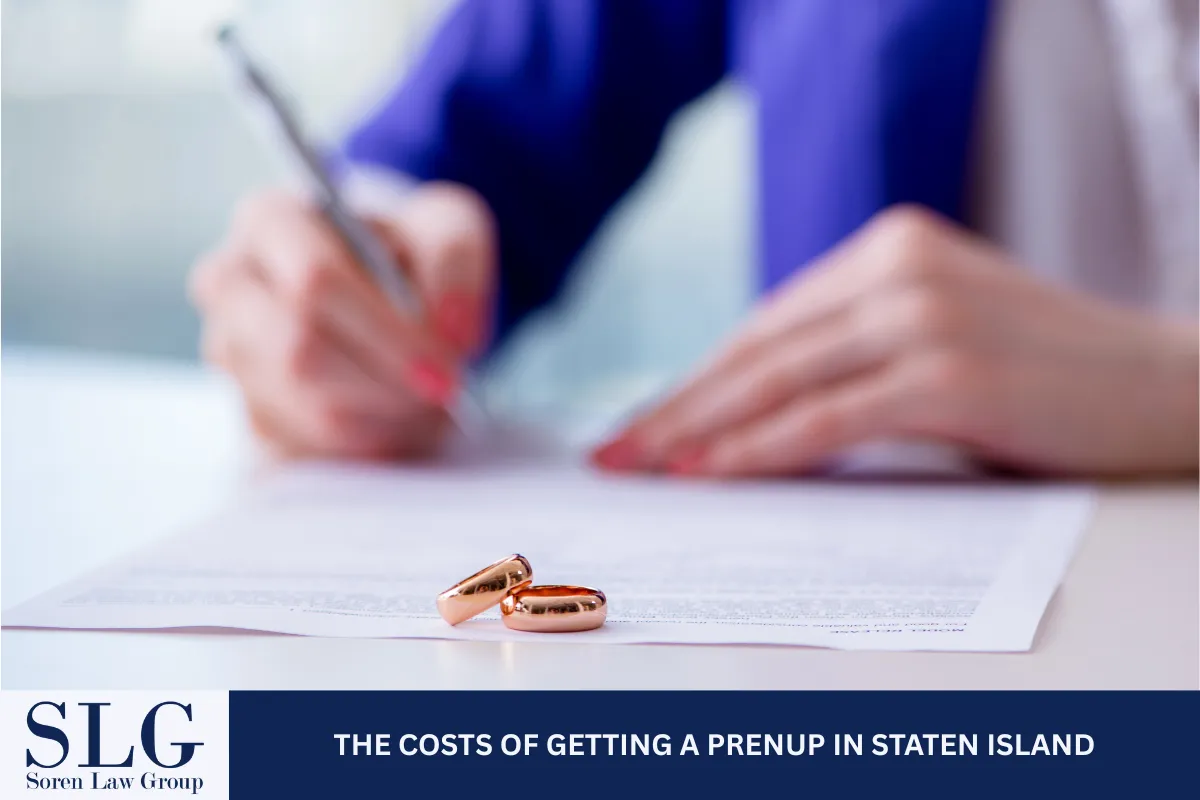
The cost for a prenuptial agreement in Staten Island varies, but here are some general guidelines:
- Simple agreements: $1,500-$2,500
- Standard cases: $2,500-$5,000
- Complex or high-asset cases: $5,000 and up
Attorneys may charge flat fees or hourly rates, and retainers are often required. If your situation involves business interests, multiple properties, or complex estate planning, costs may increase due to the time and legal expertise required.
What Issues Can (and Can’t) Be Included?
A prenuptial agreement in New York can cover:
- Marital property and separate property definitions
- Property distribution and asset division upon divorce
- Spousal support or maintenance
- Debt responsibility
- Inheritance, estate planning, and waiver of the elective share
- Real estate and business interest protections
- Retirement accounts and investments
- Sunset clauses (time limit on the prenup)
But, it cannot:
- Predetermine child custody arrangements
- Limit child support
- Encourage divorce or include illegal or unconscionable terms
Why Is Early, Careful Planning Important?
Finishing your prenuptial agreement early ensures:
- Both parties make informed, voluntary decisions.
- Ample time for full disclosure of financial responsibilities and assets.
- Review and negotiation in a calm, thorough manner.
- Reduced risk of future challenges based on duress, lack of legal advice, or unfair surprise.
Steps to Protect Yourself: From List-Making to Execution
- Work with a Staten Island prenuptial lawyer familiar with New York family law and the legal requirements for prenuptial and postnuptial agreements.
- Create a detailed list of assets, debts, income information, real estate, and business interests, and use strong supporting documentation such as tax returns or property and asset records.
- Think about special issues, such as children from prior marriages, inheritance rights, business ownership, or real estate investments.
- Please coordinate with your partner and their attorney for all draft exchanges, revisions, and negotiations.
- Allow for a review period (2-3 weeks before signing.
- Make sure the agreement is properly signed and notarized.
- Keep an extra copy in a safe place.
Your Next Steps: Secure Your Financial Future Today
Starting the prenup process early with a knowledgeable Staten Island prenuptial lawyer is the best way to protect your assets, financial rights, and peace of mind. Whether you need basic advice or help navigating complex assets, planning ensures you have time for thoughtful negotiation, full disclosure, and legal compliance. Don’t wait until the last minute—schedule a consultation with an experienced New York prenuptial agreement lawyer, organize your financial information, and start building a foundation for your marital settlement agreement today.
Staten Island Prenuptial Lawyer – Soren Law Group
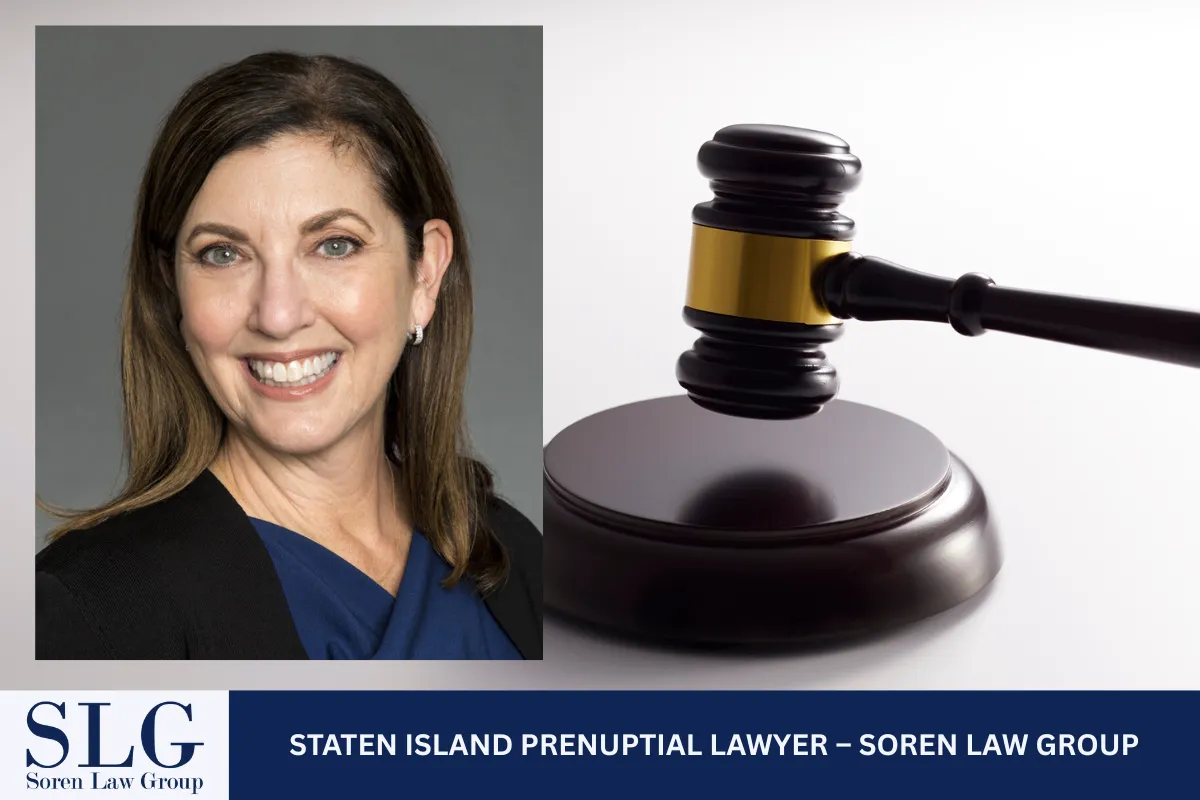
Don’t wait until the last minute to safeguard your future. At Soren Law Group, our experienced prenuptial lawyers understand the importance of starting the prenup process early for Staten Island couples. We guide you step-by-step—from financial disclosure to negotiation and final signing—ensuring your agreement is not only valid under New York law, but tailored to your needs. With our focused legal advice and proactive planning, you’ll avoid stressful, last-minute problems and protect your assets with confidence. Whether your finances are simple or complex, we’ll help you finalize your prenup well before your wedding day. Call us today at (718) 815-4500 to schedule a consultation and discover how we can help secure your peace of mind.
Still Have Questions? Here Are Answers to Common FAQs
How does a prenuptial agreement differ from a separation agreement in New York?
A prenuptial agreement is signed before marriage and outlines how finances, property, and other matters will be handled in case of divorce or death. A separation agreement is signed after a couple is already married but has decided to live apart, setting terms for separation (such as property division and spousal support), and is often used as groundwork for divorce. A prenup comes into play if the marriage ends, while a separation agreement takes effect when the couple splits but isn’t yet divorced. Both are binding under New York law if done correctly, but their purposes and timing differ.
Is a prenuptial agreement necessary if I have no significant assets?
Even if you have little to no assets when getting married, a prenuptial agreement can still be helpful. It clarifies each person’s rights and responsibilities, outlines how future assets will be handled, and can help prevent future conflicts. If you expect to accumulate wealth, inherit property, or start a business, a prenup allows you to set clear rules in advance. It also helps manage debts and ensures there’s transparency in your financial relationship.
Can we use the same attorney for both parties?
In New York, it is highly recommended that each spouse have their own lawyer to advise them independently. Using the same attorney for both parties is a conflict of interest, and most prenuptial lawyers will not represent both people in the same agreement. Separate attorneys help ensure the agreement is fair and voluntary and minimize the risk that it will be overturned later. This is especially important in Staten Island and across NYC, where courts scrutinize marital agreements for fairness and voluntariness.
What happens if we cannot agree on certain terms of the prenup?
If you and your partner run into disagreements, you can propose revisions, negotiate terms, or use a mediator or collaborative attorney to help reach an agreement. If there are still unresolved issues and the wedding date is approaching, you may choose to exclude certain terms and revisit them later using a postnuptial agreement after marriage. In rare cases, you may need to reevaluate whether a prenup is possible or relevant to your future together.
Do we need to update our prenuptial agreement if we move out of New York?
If you move to another state after signing a prenuptial agreement in New York, your document should still be valid—provided it was properly executed under New York law. However, every state has slightly different family law rules, and enforcement may vary. For peace of mind, it’s wise to have a local attorney in your new state review the agreement and, if necessary, draft a new document or amendment recognizing the latest legal requirements in your new area.
Read more: Staten Island Prenuptial Lawyer: Is a Prenup Legally Binding Without a Lawyer?

